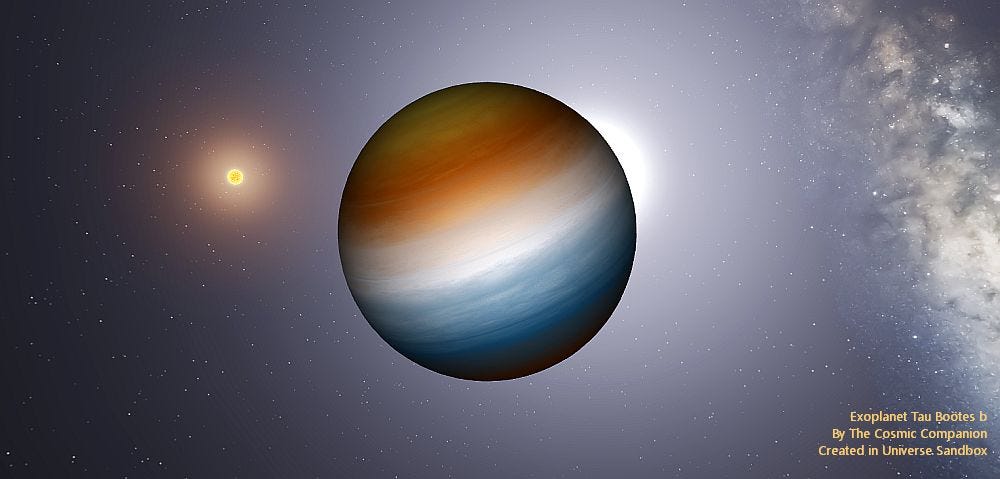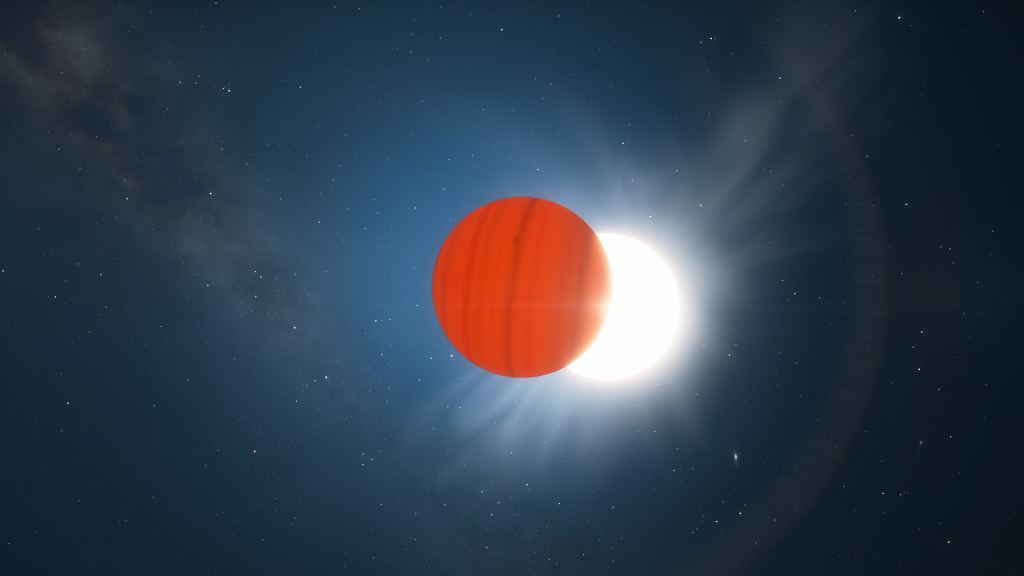Exo planet radio waves.
If you’re searching for exo planet radio waves pictures information linked to the exo planet radio waves keyword, you have come to the ideal blog. Our site always provides you with hints for refferencing the maximum quality video and image content, please kindly search and locate more enlightening video articles and graphics that fit your interests.
 Seeing Tau Bootis B In A New Light Radio Waves The Cosmic Companion From medium.com
Seeing Tau Bootis B In A New Light Radio Waves The Cosmic Companion From medium.com
Only the Tau Boötes exoplanet. Radio waves from Earth have reached dozens of stars As we continue our search for extraterrestrial life a new study estimates how many other worlds might have already spotted us. We know the exoplanet is there because. Originally published at The Guardian.
A team of astronomers from the Institute for Radio Astronomy ASTRON in the Netherlands have now found a new way to detect themusing radio waves.
These signals show the first hints of magnetic fields around worlds in other solar systems and may offer astronomers a new way to explore alien worlds spread throughout the galaxy. The radio waves bear the tell-tale signature of aurorae caused by an interaction between a star and its planet. Radio waves from the auroras of planets like Jupiter could be used to detect exoplanets that orbit at large distances from their parent star according to a new study. Astronomers around the globe have been within the hunt for planets stars and galaxies that are gentle years away from us looking for an indication of life. The closer the source the more audible these waves are.
 Source: researchgate.net
Source: researchgate.net
This will in turn help the astronomers to decipher the interior of the. In this method scientists detect an exoplanet via auroras formed on it by the interaction of the star and a strong magnetic field around a planetary body. An international team of scientists have picked up the first radio waves emitted by an exoplanet. The First Exoplanet Discovered with Radio Waves Using the Low Frequency Array LOFAR radio telescope the astronomers were able to identify an exoplanet 26 light-years away orbiting a dwarf star called GJ 1151. GJ1151 a red dwarf 26 light-years away has a strong magnetic field which gets disturbed by a planet passing through it producing radio waves as a result.
These signals show the first hints of magnetic fields around worlds in other solar systems and may offer astronomers a new way to explore alien worlds spread throughout the galaxy.
Its a method that could help us find way more of the hard-to-find rocky exoplanets like Mercury Venus Earth and Mars. The discovery of radio waves in the exo-planet of the star system will open up a new way examine the alien world. Far from Earth within the Tau Boötes planetary system a massive exoplanet orbiting a pair of parent stars shines brightly in radio waves. In this artistic rendering of the Tau Boötes b system the lines representing the invisible magnetic field are shown protecting the hot.
 Source: researchgate.net
Source: researchgate.net
In this method scientists detect an exoplanet via auroras formed on it by the interaction of the star and a strong magnetic field around a planetary body. Astronomers around the globe have been within the hunt for planets stars and galaxies that are gentle years away from us looking for an indication of life. Using the Low Frequency Array LOFAR radio telescope scientists in the Netherlands have detected unusual radio waves coming from the nearby red dwarf star GJ1151. The radio waves bear the tell-tale signature of aurorae caused by an interaction between a star and its planet.
 Source: freepressjournal.in
Source: freepressjournal.in
The First Exoplanet Discovered with Radio Waves Using the Low Frequency Array LOFAR radio telescope the astronomers were able to identify an exoplanet 26 light-years away orbiting a dwarf star called GJ 1151. The closer the source the more audible these waves are. The signal lies in the water hole quiet zone of the electromagnetic spectrum which scientists consider an attractive band for alien civilisations to broadcast interstellar signals. Using the Low Frequency Array LOFAR radio telescope scientists in the Netherlands have detected unusual radio waves coming from the nearby red dwarf star GJ1151.
 Source: orissapost.com
Source: orissapost.com
Radio waves from the auroras of planets like Jupiter could be used to detect exoplanets that orbit at large distances from their parent star according to a new study. An international team of scientists have picked up the first radio waves emitted by an exoplanet. The 1420MHz burst of radio waves known as SHGb0214a was observed three times before vanishing. The radio waves bear the tell-tale signature of aurorae caused by an interaction between a star and its planet.
GJ1151 a red dwarf 26 light-years away has a strong magnetic field which gets disturbed by a planet passing through it producing radio waves as a result. Using the Low Frequency Array LOFAR radio telescope scientists in the Netherlands have detected unusual radio waves coming from the nearby red dwarf star GJ1151. ASTRONOMERS have detected for the very first time a possible radio signal from a distant exoplanet with researchers calling the discovery a novel way to examine alien worlds. Radio waves from Earth have reached dozens of stars As we continue our search for extraterrestrial life a new study estimates how many other worlds might have already spotted us.
Radio waves from Earth have reached dozens of stars As we continue our search for extraterrestrial life a new study estimates how many other worlds might have already spotted us.
We know the exoplanet is there because. This will in turn help the astronomers to decipher the interior of the. The planet is a Hot Jupiter orbiting a star system 40. Radio waves from Earth have reached dozens of stars As we continue our search for extraterrestrial life a new study estimates how many other worlds might have already spotted us. The researchers therefore sought to hear waves emitted by planets located 100000 times farther away outside our solar system reports.
 Source: freepressjournal.in
Source: freepressjournal.in
The signal lies in the water hole quiet zone of the electromagnetic spectrum which scientists consider an attractive band for alien civilisations to broadcast interstellar signals. ASTRONOMERS have detected for the very first time a possible radio signal from a distant exoplanet with researchers calling the discovery a novel way to examine alien worlds. However the star is generating radio waves because the orbiting planet acts like an electric dynamo. The radio waves help to learn about the magnetic field of the planet. The researchers therefore sought to hear waves emitted by planets located 100000 times farther away outside our solar system reports.
A team of astronomers from the Institute for Radio Astronomy ASTRON in the Netherlands have now found a new way to detect themusing radio waves. The researchers therefore sought to hear waves emitted by planets located 100000 times farther away outside our solar system reports. The signal lies in the water hole quiet zone of the electromagnetic spectrum which scientists consider an attractive band for alien civilisations to broadcast interstellar signals. However in a first scientists have been able to discover an exoplanet and a wobbly Star using just radio waves.
Its a method that could help us find way more of the hard-to-find rocky exoplanets like Mercury Venus Earth and Mars.
ASTRONOMERS have detected for the very first time a possible radio signal from a distant exoplanet with researchers calling the discovery a novel way to examine alien worlds. In this method scientists detect an exoplanet via auroras formed on it by the interaction of the star and a strong magnetic field around a planetary body. Auroras are flares of. This will in turn help the astronomers to decipher the interior of the.
 Source: freepressjournal.in
Source: freepressjournal.in
However in a first scientists have been able to discover an exoplanet and a wobbly Star using just radio waves. In this method scientists detect an exoplanet via auroras formed on it by the interaction of the star and a strong magnetic field around a planetary body. The radio waves help to learn about the magnetic field of the planet. The First Exoplanet Discovered with Radio Waves Using the Low Frequency Array LOFAR radio telescope the astronomers were able to identify an exoplanet 26 light-years away orbiting a dwarf star called GJ 1151.
 Source: theguardian.com
Source: theguardian.com
We know the exoplanet is there because. The closer the source the more audible these waves are. The radio waves bear the tell-tale signature of aurorae caused by an interaction between a star and its planet. However the star is generating radio waves because the orbiting planet acts like an electric dynamo.
 Source: researchgate.net
Source: researchgate.net
Radio waves from Earth have reached dozens of stars As we continue our search for extraterrestrial life a new study estimates how many other worlds might have already spotted us. Far from Earth within the Tau Boötes planetary system a massive exoplanet orbiting a pair of parent stars shines brightly in radio waves. The researchers therefore sought to hear waves emitted by planets located 100000 times farther away outside our solar system reports. The 1420MHz burst of radio waves known as SHGb0214a was observed three times before vanishing.
GJ1151 a red dwarf 26 light-years away has a strong magnetic field which gets disturbed by a planet passing through it producing radio waves as a result.
Auroras are flares of. We know the exoplanet is there because. All the planets with a magnetic field emit radio waves including the Earth explains a researcher from Orleans. However in a first scientists have been able to discover an exoplanet and a wobbly Star using just radio waves. Radio wave activity from the star called GJ 1151 has been linked to an interaction between the stars magnetic field and an orbiting planet - much like Jupiters magnetic field is known to interact with the planets moon Io.
 Source: orissapost.com
Source: orissapost.com
Auroras are flares of. GJ1151 a red dwarf 26 light-years away has a strong magnetic field which gets disturbed by a planet passing through it producing radio waves as a result. The First Exoplanet Discovered with Radio Waves Using the Low Frequency Array LOFAR radio telescope the astronomers were able to identify an exoplanet 26 light-years away orbiting a dwarf star called GJ 1151. The 1420MHz burst of radio waves known as SHGb0214a was observed three times before vanishing. The group also observed other potential exoplanetary radio-emission candidates in the 55 Cancri in the constellation Cancer and Upsilon Andromedae systems.
Radio waves from Earth have reached dozens of stars As we continue our search for extraterrestrial life a new study estimates how many other worlds might have already spotted us.
The radio emission from a star-planet interaction has been predicted for over. The closer the source the more audible these waves are. The radio waves bear the tell-tale signature of aurorae caused by an interaction between a star and its planet. Far from Earth within the Tau Boötes planetary system a massive exoplanet orbiting a pair of parent stars shines brightly in radio waves.
 Source: freepressjournal.in
Source: freepressjournal.in
The planet is a Hot Jupiter orbiting a star system 40. The signal lies in the water hole quiet zone of the electromagnetic spectrum which scientists consider an attractive band for alien civilisations to broadcast interstellar signals. Astronomers around the globe have been within the hunt for planets stars and galaxies that are gentle years away from us looking for an indication of life. An international team of scientists have picked up the first radio waves emitted by an exoplanet.
 Source: astronomynow.com
Source: astronomynow.com
GJ1151 a red dwarf 26 light-years away has a strong magnetic field which gets disturbed by a planet passing through it producing radio waves as a result. We know the exoplanet is there because. Its a method that could help us find way more of the hard-to-find rocky exoplanets like Mercury Venus Earth and Mars. GJ1151 a red dwarf 26 light-years away has a strong magnetic field which gets disturbed by a planet passing through it producing radio waves as a result.
 Source: english.jagran.com
Source: english.jagran.com
However in a first scientists have been able to discover an exoplanet and a wobbly Star using just radio waves. The signal lies in the water hole quiet zone of the electromagnetic spectrum which scientists consider an attractive band for alien civilisations to broadcast interstellar signals. These signals show the first hints of magnetic fields around worlds in other solar systems and may offer astronomers a new way to explore alien worlds spread throughout the galaxy. The radio emission from a star-planet interaction has been predicted for over.
The radio emission from a star-planet interaction has been predicted for over.
The 1420MHz burst of radio waves known as SHGb0214a was observed three times before vanishing. Only the Tau Boötes exoplanet. The closer the source the more audible these waves are. A team of astronomers from the Institute for Radio Astronomy ASTRON in the Netherlands have now found a new way to detect themusing radio waves. The researchers therefore sought to hear waves emitted by planets located 100000 times farther away outside our solar system reports.
 Source: researchgate.net
Source: researchgate.net
The planet is a Hot Jupiter orbiting a star system 40. Far from Earth within the Tau Boötes planetary system a massive exoplanet orbiting a pair of parent stars shines brightly in radio waves. In this method scientists detect an exoplanet via auroras formed on it by the interaction of the star and a strong magnetic field around a planetary body. The discovery of radio waves in the exo-planet of the star system will open up a new way examine the alien world. The closer the source the more audible these waves are.
The radio waves bear the tell-tale signature of aurorae caused by an interaction between a star and its planet.
The planet is a Hot Jupiter orbiting a star system 40. The radio waves help to learn about the magnetic field of the planet. The discovery of radio waves in the exo-planet of the star system will open up a new way examine the alien world. Radio wave activity from the star called GJ 1151 has been linked to an interaction between the stars magnetic field and an orbiting planet - much like Jupiters magnetic field is known to interact with the planets moon Io.
 Source: freepressjournal.in
Source: freepressjournal.in
The researchers therefore sought to hear waves emitted by planets located 100000 times farther away outside our solar system reports. The closer the source the more audible these waves are. The radio waves help to learn about the magnetic field of the planet. However the star is generating radio waves because the orbiting planet acts like an electric dynamo. The 1420MHz burst of radio waves known as SHGb0214a was observed three times before vanishing.
 Source: medium.com
Source: medium.com
Only the Tau Boötes exoplanet. These signals show the first hints of magnetic fields around worlds in other solar systems and may offer astronomers a new way to explore alien worlds spread throughout the galaxy. Originally published at The Guardian. The signal lies in the water hole quiet zone of the electromagnetic spectrum which scientists consider an attractive band for alien civilisations to broadcast interstellar signals. An international team of scientists have picked up the first radio waves emitted by an exoplanet.
 Source: universetoday.com
Source: universetoday.com
A team of astronomers from the Institute for Radio Astronomy ASTRON in the Netherlands have now found a new way to detect themusing radio waves. Its a method that could help us find way more of the hard-to-find rocky exoplanets like Mercury Venus Earth and Mars. Radio wave activity from the star called GJ 1151 has been linked to an interaction between the stars magnetic field and an orbiting planet - much like Jupiters magnetic field is known to interact with the planets moon Io. ASTRONOMERS have detected for the very first time a possible radio signal from a distant exoplanet with researchers calling the discovery a novel way to examine alien worlds. We know the exoplanet is there because.
This site is an open community for users to do sharing their favorite wallpapers on the internet, all images or pictures in this website are for personal wallpaper use only, it is stricly prohibited to use this wallpaper for commercial purposes, if you are the author and find this image is shared without your permission, please kindly raise a DMCA report to Us.
If you find this site value, please support us by sharing this posts to your own social media accounts like Facebook, Instagram and so on or you can also bookmark this blog page with the title exo planet radio waves by using Ctrl + D for devices a laptop with a Windows operating system or Command + D for laptops with an Apple operating system. If you use a smartphone, you can also use the drawer menu of the browser you are using. Whether it’s a Windows, Mac, iOS or Android operating system, you will still be able to bookmark this website.





